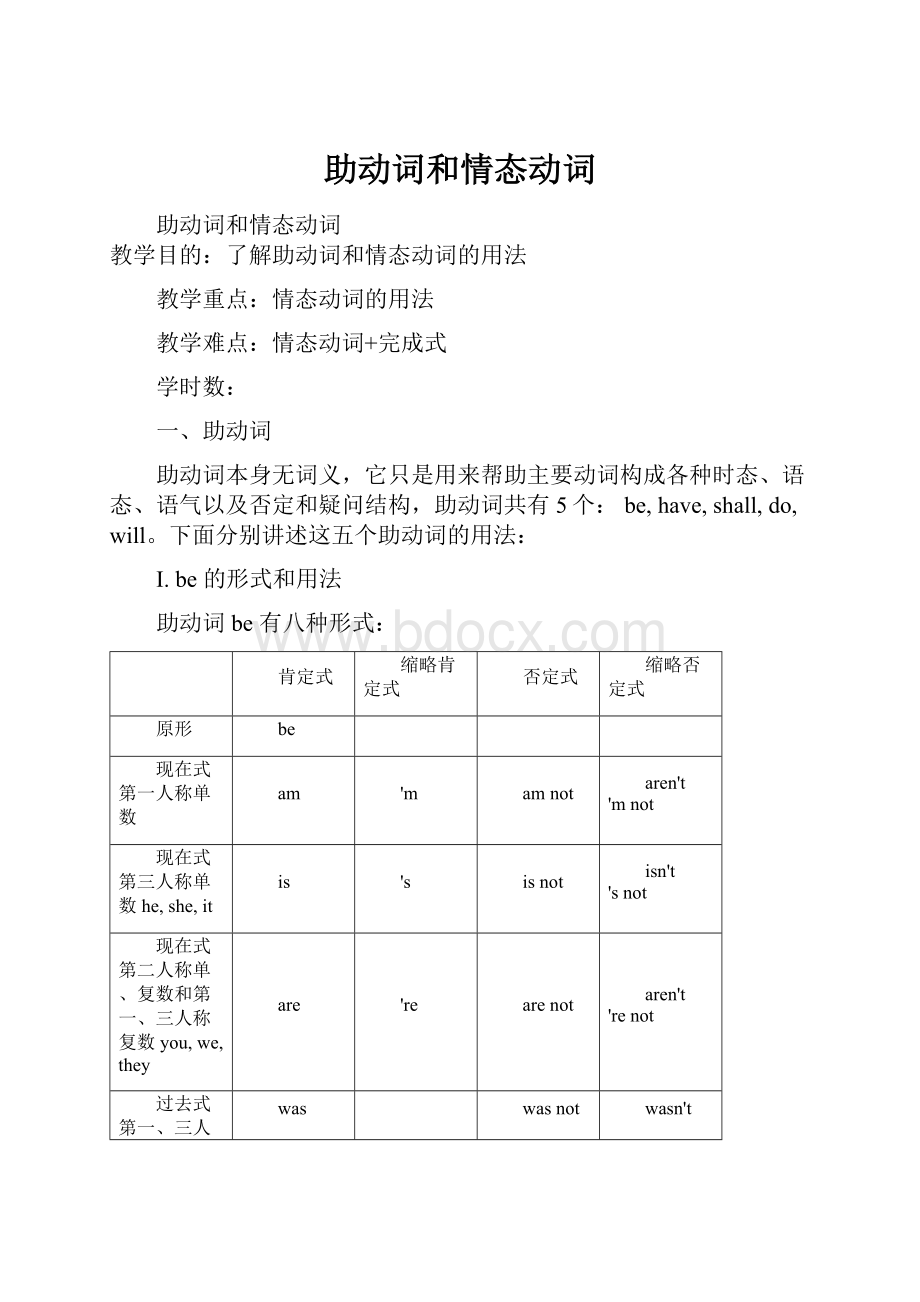助动词和情态动词.docx
《助动词和情态动词.docx》由会员分享,可在线阅读,更多相关《助动词和情态动词.docx(20页珍藏版)》请在冰豆网上搜索。

助动词和情态动词
助动词和情态动词
教学目的:
了解助动词和情态动词的用法
教学重点:
情态动词的用法
教学难点:
情态动词+完成式
学时数:
一、助动词
助动词本身无词义,它只是用来帮助主要动词构成各种时态、语态、语气以及否定和疑问结构,助动词共有5个:
be,have,shall,do,will。
下面分别讲述这五个助动词的用法:
Ⅰ.be的形式和用法
助动词be有八种形式:
肯定式
缩略肯定式
否定式
缩略否定式
原形
be
现在式第一人称单数
am
'm
amnot
aren't
'mnot
现在式第三人称单数he,she,it
is
's
isnot
isn't
'snot
现在式第二人称单、复数和第一、三人称复数you,we,they
are
're
arenot
aren't
'renot
过去式第一、三人称单数I,he,she,it
was
wasnot
wasn't
过去式第二人称单、复数和第一、三人称复数you,we,they
were
werenot
weren't
现在分词
being
notbeing
过去分词
been
notbeen
Note:
在英国英语中,aren't使用很广泛。
在美国英语中使用较多的是被认为非标准的ain't。
助动词be的主要用法是:
1.与现在分词构成各种进行时态及与have和现在分词构成完成进行进态
(1)FearofcrimeisslowlyparalyzingAmericansociety.
犯罪恐惧症正逐渐地使用美国社会陷于瘫痪。
(2)ThetelephonehadbeenringingforthreeminutesbeforeitwasanswereD.
电话铃响了三分钟才有人接。
2.与过去分词构成被动语态
(1)Hewasanardentfighterforfreedomandindependence.Hewaslovedbymillionsandhatedonlybyahandful.他是个争取自由和独立的热诚战士,为成百万人所爱戴,为仅仅一小撮人所仇恨。
(2)TheycametoEuropewheretheirmotherhadbeeneducatedandstayedthreeyears.他们来到他们的母亲受教育的欧洲,并待了三年。
3.此外,be还可用作连系动词,如:
Itwasoneofthehappiestafternoonshehadeverspent.
那是他有生以来最愉快的一个下午。
Ⅱ.have的形式和用法
助动词have有五种形式:
肯定式
缩略肯定式
否定式
缩略否定式
原形
have
've
havenot
haven't
'venot
现在式第三人称单数
has
's
hasnot
hasn't
'snot
现在式第三人称单数
has
's
hasnot
hasn't
'snot
过去式
had
'd
hadnot
hadn't
'dnot
现在分词
having
nothaving
过去分词
had
助动词have的主要用法是:
1.与过去分词构成各种完成时态
(1)Newtonhasexplainedthemovmentsofthemoonfromtheattractionsoftheearth.牛顿阐明了月球受到地球引力而运行的规律。
(2)Reluctantly,sheopenedthedoor,shehadnotkeptitlocked;therehadbeennoneed.她勉强地开了门。
她没有锁门,也没有必要锁门。
2.与been+现在分词构成各种完成进行时态
(1)Menhavebeendiggingsaltoutofitforsixhundredyearsandyetthereseemsasmuchleftasever.人们在这里掘盐已六年,但盐似乎还是那么多。
(2)Inanothermonth'stimeMrHenrywillhavebeenteachinghereforexactlythirtyyears.再过一个月,享利先生就将在这里从事教学整30年了。
3.此外,have还可用作实义动词,意谓”有”、”吃”等
(1)Badnewshaswings.丑事传千里。
(2)You'reanaemic,youmusthavesomeiron.你患贫血症了,应该服一些铁。
4.have还可用作使役动词
(1)Wenowhavetheproblemsolved.我们现已把这个问题解决了。
(2)Ihadatoothoutthisafternoon.我今天下午拔了一颗牙。
Note:
have用作实义动词时不能使用缩略式。
词组haveto有情态意义,详见”情态动词”。
Ⅲ.do的形式和用法
助动词do有三种形式:
肯定式
否定式
缩略否定式
原形
do
donot
don't
现在式第三人称单数
does
doesnot
doesn't
过去式
did
didnot
didn't
Note:
do用作实义动词时有现在分词doing和过去分词done.
助动词do的主要用法是:
1.构成现在一般时和过去一般时的疑问句
(1)Doyoualwayscarryanumbrella?
你经常带伞吗?
(2)Dideverythingcomeoffallright?
一切都进行的有顺利吗?
2.构成现在一般时和过去一般时的否定句
(1)Shedidn'tcooldownforhoursafterthatargument.
在那场争辩之后,她有好几个小时都没平静下来。
(2)Don'tworry,hewillbebroughttobookforhiswickednessoneday.
别担心,他的恶行总有一天要受到惩罚的。
3.用于替代,以避免重复
(1)MayIcomeroundinthemorning?
上午我可以来拜访你吗?
Yes,pleasedo.可以,请来吧。
(do替代comeround)
(2)Idon'tlikecoffeeandneitherdoesmywife.
我不喜欢咖啡,我妻子也不喜欢。
(does替代like)
4.用于强调
(1)MyparentsthinkIdidn'tstudyformyexams,butdidstudy.
我爸爸妈妈认为我考试前没有复习,但我是复习了。
(2)AlthoughIhavelittletimeforentertainment,Idogotothetheatreonceinawhile.虽然我很省有时间娱乐,一但我有时间就去看戏。
(3)We'reverypleasedthatshedoesintendtocome.
她的确打算来,我们非常高兴。
(4)Theletterwewereexpectingneverdidarrive.我们期待的信一直没有到。
(5)Doyourememberhowkindshewas?
你记得她多友善吗?
Icertainlydoremember.当然记得。
5.用于恳求
(1)Docometothepartytonight.务请今晚来参加晚会。
(2)Dobequiet!
请别作声!
6.此外,do还可用作实义动词,意谓”做”,”干”等等
(1)She'sdoingherknitting.她正在编织衣物。
(2)Sheinterruptedhimbeforehisspeechwasdone.
她不等他把话说完就打断了他。
(3)Badbooksdogreatharm.坏书有很大害处。
(4)Willyoudomeafavour?
你愿帮我个忙吗?
(5)Janeisdoingthedishes.珍妮正在洗碟子。
(6)Iwillisdomybest.我愿尽力而为。
(7)Thatwilldo.行了(或够了)。
Note:
如用其它时态,疑问句的助动词须提至主语前,否定句的助动词之后加not如:
(1)Willhebeabletohearatsuchadistance?
离这么远,他会听得到吗?
(2)Youhaven'tbeenabroadbefore,haveyou?
你以前没出过国,是吗?
Ⅳ.shall(should)和will(would)的形式和用法
助动词shall(过去式should)和will(过去式would)有下列几种形式:
肯定式
缩略肯定式
否定式
缩略否定式
shall
'll
shallnot
shan't
should
shouldnot
shouldn't
will
'll
willnot
won't
'llnot
would
'd
wouldnot
wouldn't
'dnot
助动词shall(should)和will(would)可用于构成各种将来和过去将来时态,shall(should)用于第一人称,will(would)用于第二、第三人称。
在当代英语(尤其是美国英语中)will(would)常用于一切人称。
1.shall用于各种将来时态第一人称(当代英语多用will)
(1)Weshallbegoingawaytomorrowbyanearlytrain.
我们将于明日搭早班火车离开。
(2)IshallletyouknowassoonasIhaveheardfromthem.
我一接到他们的信、当即告诉你。
2.should用于各种过去将来时态的第一人称(当代英语多用would)
(1)SothiswastheplacewhereIshouldstudyforthethreeyears.Itmadeabadfirstimpression.后来,这就是我学习三年的地方,它给我的第一个印象可不好。
(2)TheBCCweatherreportthismorningsaidthatweshouldhaverain.
英国广播公司今晨的天气预报说,我们这儿将有雨。
3.will用于各种将来时态的第二、第三人称
(1)Theywillbelookingforanyoneconnectedwithher.
他们将寻找每一个与她有往来的人。
(2)TheplayiscomingoffinAugust-Bythentheplaywillhavebeenrunningforthreemonths.这个剧将于八月停演--到那时它将连演三个月了。
4.would用于各种过去将来时态的第二、第三人称
(1)Theysaiditwouldbefine.人们说天气会很好。
(2)Theywouldhavefinishedbyfiveo'clock.他们将于五时前完工。
Note:
shall(should)和will(would)可用作情态动词。
详见”情态动词”。
should和would可以构成虚拟语气,详见”虚拟语气”。
二、情态动词
情态动词表示说话人对某一动作或状态的态度。
情态动词有一定词义;不受主语人称和数的变化影响;与主要动词的原形(或称不带to的不定式)一起构成谓语(除ought to作固定词组看待)。
下面分别介绍情态动词的用法:
1. can (could)
1)表示能力,could主要指过去时间。
Two eyes can see more than one. 两只眼比一只眼看得清。
Could the girl read before she went to school?
这女孩上学前能识字吗?
2)表示可能(理论上或是逻辑判断上)。
The temperature can fall to –60℃, that is 60℃ below freezing.
气温可降至—60℃,也就是零下60℃。
He can´t (couldn´t) have enough money for a new car.
他不可能有足够的钱买新车。
You mustn’t smoke while you’re walking around in the wood.You could start a fire.
在林子里走时勿吸烟,那样可能会引起火灾。
3)表示允许。
Can I have a look at your new pen?
我可以看一看你的新钢笔吗?
He asked whether he could take the book out of the reading—room.
他问他可不可以把书带出阅览室。
4)表惊异、怀疑、不相信等态度。
主要用于否定句、疑问句或感叹句中。
Where can (could) they have gone to?
他们会去哪儿了呢?
He can´t (couldn´t) be over sixty. 他不可能超过六十岁。
How can you be so careless?
你怎么这么粗心?
5)比较委婉客气地提出问题或陈述看法。
Can (Could) you lend me a hand?
帮我一把好吗?
I’m afraid we couldn’t give you an answer today. 恐怕我们今天不能给你答复。
2. may (might)
1)表允许,might可以指过去时间,也可指现在时间,语气更委婉。
You may take whatever you like. 你喜欢什么就拿什么。
He told me that I might smoke in the room. 他告诉我可以在房间里抽烟。
May (Might) I ask for a photo of your baby?
我可以要一张你宝宝的照片吗?
在回答以may引起的问句时,多避免用这个词,而用其它方式,如Yes, please. / Certainly. / Please don´t ./ You´d better not. / No, you mustn´t.等,以免显得太严峻或不客气。
2)表可能(事实上)。
可以指过去时间,也可以指现在时间,但语气更加不肯定。
He may be at home. 他可能在家。
She may not know about it. 她可能不知道这件事。
He was afraid they might not agree with him.
他担心他们可能不同意他的意见。
They might be having a meeting, but I´m not sure.
他们有可能在开会,不过我不肯定。
3. must
1)表示义务。
意为”必须”(主观意志)。
We must do everything step by step. 我们一切都必须循序渐进地做。
You mustn´t talk to her like that. 你不可能那样对她说话。
--Must we hand in our exercise—books now?
我们现在就要交练习本吗?
--No, you needn´t. / No, you don´t have to. 不必。
(这种情况下,一般不用mustn´t)
2)表示揣测。
意为”想必、准是、一定”等,只用于肯定句。
He must be ill. He looks so pale. 他准是病了。
他的脸色苍白。
She´s wearing a diamond necklace. She must have a lot of money.
她戴着钻石项链,一定很有钱。
4. shall
1)表征询意见,用于第一、第三人称疑问句。
Shall I get you some tea?
我给你点茶好吗?
Shall the boy wait outside?
让那男孩在外面等吗?
What shall we do this evening?
我们今晚做什么?
2)表说话人的意愿,有”命令、允诺、警告、决心”等意思,用于第二、第三人称陈述句。
You shall do as I say. 按我说的做。
(命令)
You shall have my answer tomorrow. 你明天可以得到我的答复。
(允诺)
He shall be sorry for it one day, I tell you.
有一天他会后悔的,我告诉你。
(警告)
Nothing shall stop us from carrying out the plan.
什么也不能阻止我们执行这项计划。
(决心)
5. will
1)表意愿,用于各种人称陈述句。
I will do anything for you. 我愿为你做任何事。
None is so blind as those who won´t see. 不愿看的人眼最瞎。
If you will read the book, I´ll lend it to you.
如果你愿意读这本书,我会把它借给你。
2)表请求,用于疑问句。
Will you close the window?
It´s a bit cold.请你把窗户关上好吗?
有点冷。
Won´t you drink some more coffee?
再来一点咖啡好吗?
3)表示某种倾向或习惯性动作。
Fish will die out of water. 鱼离开水就不能活。
The door won´t open. 这门打不开。
The boy will sit there hour after hour looking at the traffic go by.
那男孩常常坐在那里好几个钟点,看着车辆行人通过。
6. should
1)表义务。
意为”应该”(某件事宜于做),用于各种人称。
You should be polite to your teachers. 你对老师应该有礼貌。
You shouldn’t waste any time. 你不应该浪费时间。
2)表推测,意为“想必一定、照说应该、估计”等。
The film should be very good as it is starring first—class actors.
这部新电影是一流演员主演的,估计拍得很好。
They should be home by now. 照说他们现在应当已经到家了。
7.would
1)表意愿。
They would not let him in because he was poorly dressed.
他们不让他进去因为他衣着破旧。
I said I would do anything for you. 我说过我愿意为你做任何事。
2)表委婉地提出请求、建议或看法。
Would you like another glass of beer?
再来杯啤酒好吗?
Would you mind cleaning the window?
请把窗户擦一下好吗?
They wouldn´t have anything against it. 他们不会有什么反对意见。
3)表过去反复发生的动作或过去的一种倾向。
Every time she was in trouble, she would go to him for help.
她每遇到麻烦都会向她求助。
他告诉我盒子打不开了。
8. ought to
1)表义务,意为”应该”(因责任、义务等该做),口气比should稍重。
You are his father. You ought to take care of him. 你是他父亲,应当管他。
You oughtn´t to smoke so much. 你不应该抽这么多烟。
2)表推测,暗含很大的可能,语气较弱。
Han Mei ought to know his telephone number. 韩梅该知道他的电话号码。
There´s a fine sunset; it ought to be a fine day tomorrow.
今天有晚霞,明天应该是个好天。
9. used to
表示过去的习惯动作或状态,现在不复发生或存在。
疑问式和否定式有两种。
He used to live in the countryside, but now he lives in the city.
他过去住在乡下,现在住在城里。
Hedidn’tusetosmokecigarettes.
Heusedn’ttosmokecigarettes.
Didn’tMariausetobeinterestedinthetheatre?
Usedn’tMariatobeinterestedinthetheatre?
★此外,“情态动词+现在完成式”是一种较活跃的语法现象,在各种考试中屡见不鲜。
现将其用法归纳如下:
I.对过去行为发生的可能性的推测
1.“m